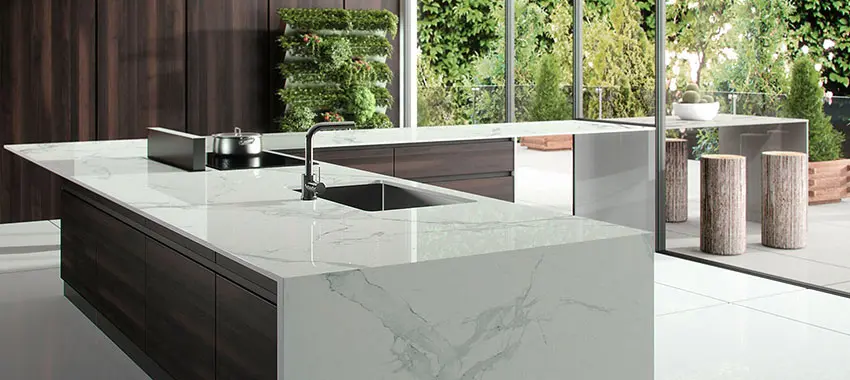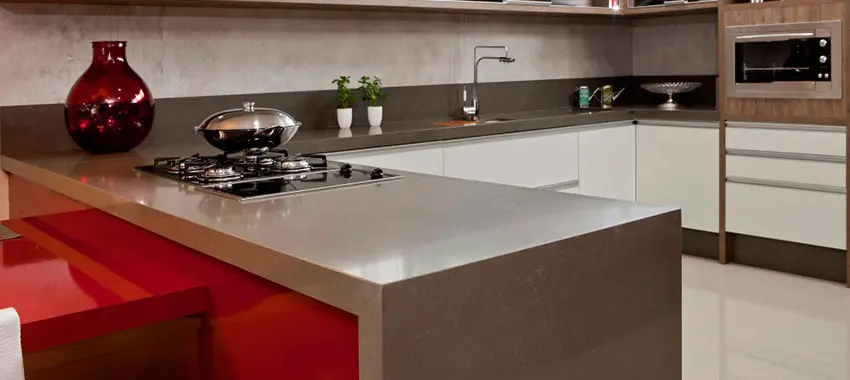Oct
How To Pick A Countertop Material For Your Outdoor Kitchen?
- 2024
- FlintStoneTops
If you’re thinking of redoing your outdoor space and want to build a backyard kitchen, then one of the important things is figuring out the countertop material you need for your outdoor kitchen. The most popular choice is granite countertops but is it the only option? Here is what to know.
What To Know When Choosing A Countertop For An Outdoor Kitchen?
Before diving into the materials that are good for outdoor kitchen countertops, you need to understand what makes a countertop material good and what doesn’t. So, here are all the things you need to consider when choosing a material.
The Durability
The durability of a countertop material matters the most. Having a durable countertop material in an indoor kitchen is one thing, but you need to give durability even more consideration if you are to choose a countertop surface for an outdoor kitchen.
An outdoor kitchen is exposed to all kinds of elements and you want to ensure that you’re choosing a material that can withstand everything and last long for years to come. The last thing you need is a countertop material that you will need to replace every so often because it fades or cracks with heat, cold, moisture, or sunlight.
Resistance To Outdoor Elements
As mentioned previously, an outdoor kitchen is exposed to outdoor elements, beaming sunlight, downpours, and dryness. These things aren’t necessarily a problem in an indoor kitchen, but in an outdoor kitchen, you need to be able to factor in all of these things to ensure that you’re choosing a material that will be able to endure all of the harsh and continuous conditions of the weather.
So, this is important to do and you need to compare materials based on their resistance to heat, UV light rays, and even dryness because it will make a difference.
Water Resistance
The next most important bit to go over is the water resistance of a countertop material. Usually, natural stones and man-made materials are the best countertop materials out there, but natural stones are not resistant to water damage because they are naturally porous. So, you either have to seal them or you need to opt for materials that don’t have that problem altogether like stainless steel and porcelain tiles or slabs.
Water may look harmless, but it can spoil and damage the material from the inside and in an outdoor kitchen, you need to give water resistance more importance because it can be the difference between longevity and premature damage.
Now, natural stones may not be water-resistant, but they are still some of the best options for outdoor kitchens so don’t rule them out.
Price
The next bit to go over is the price of the countertop material you’re going for in the outdoor kitchen. Your budget is really important when it comes to buying a countertop material for your outdoor kitchen. Outdoor countertop materials often do cost a bit more, and that is because they are specifically treated to last longer in the kitchen and outside.
So, when you’re considering materials for your outdoor kitchen, make sure that you know what each of them costs, so you can create a budget accordingly. If you can’t afford it, then everything is pretty much pointless.
Maintenance
You also want to choose a material that doesn’t need to be maintained too frequently. Now, a couple of months later, maintenance is overdue and that is pretty normal, but what isn’t is the fact that you need to slave over the material day in and day out because without it, the material will wither away.
Best Materials For Outdoor Kitchen Countertops
Now that you know what things you need to look out for, here are some of the countertop materials that are considered excellent for an outdoor kitchen.
Granite
The first and most amazing material for an outdoor kitchen is the beautiful and strong granite. Granite is a natural stone that is made out of melted rocks and minerals under high temperature and pressure and the result is a rock so beautiful and mesmerizing that you can’t help but want it in your kitchen.
It is a very strong material and the best part is that it lasts for years to come without any major problems. The only downside to this material is the price and the maintenance it needs.
Stainless Steel
If you want to say goodbye to the maintenance and the looking after of countertop material, then stainless steel countertops will take care of everything. Stainless steel is pretty much the answer to all of your countertop and outdoor kitchen-related problems.
The material is non-porous, it doesn’t need to be sealed or maintained in any way, it’s beautiful, especially if you’re someone who loves an industrial and minimal look, and it’s overall very strong. So, if you have a bit of room in your budget, then definitely go for stainless steel, because you can set it and forget it.
But keep in mind that stainless steel gets cold to touch in winter and becomes very warm under direct sunlight.
Glass
If you’re looking for another maintenance-free option in countertops, then glass won’t disappoint you. Glass is a very beautiful and hassle-free material and it is one of the best options you can go for because it does not need to be cleaned and it’s also amazing when it comes to longevity.
The only downside of glass countertops is the fact that it is, infamously, prone to breakage. If you let it out and something falls on top of the countertops with a reasonable impact, then it can shatter, so that’s just something you need to look out for.
Porcelain Tiles
Porcelain tiles are also a great option when it comes to outdoor kitchen countertops. Tiles are mostly very easy to install and even though they are not as strong as thick slabs of rock or man-made material, it is very easily replaceable, so much so that you can even do so by yourself.
Porcelain tiles are also available in many designs and patterns so you can choose any color or pattern you want.
The only problem with tile is the fact that it can be hard to clean, especially around the crevices of the tile, because the space between the tile, also known as grout can be hard to reach into and clean.
If you like porcelain as a countertop surface but not tiles, you can also choose porcelain slabs that don’t have grout lines. However, if you like tiles, you can also look into stone tiles like granite tiles, marble tiles, and can also ask for concrete tiles. But they won’t be water-resistant whereas porcelain tiles and slabs are.
Quartzite
Lastly, quartzite is another natural stone that people often confuse with quartz. Quartz is a man-made material and it’s not a good choice for outdoors since it doesn’t have natural UV protection and sunlight can make the material dull.
However, with quartzite, you won’t have to face any of these problems because it is a durable, waterproof, and stain-resistant material that will surprise you with its qualities and strength.
Conclusion
An outdoor kitchen needs to be sturdy, otherwise, it won’t last long. As you’re choosing durable materials like concrete and stainless steel for other parts of the kitchen, don’t forget to pick a sturdy option when it comes to your outdoor kitchen countertops. Get in touch with a granite contractor Potomac to take a look at various options and choose the right one.



